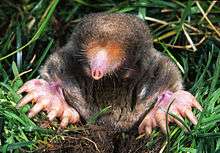Scalopini
| Scalopini | |
|---|---|
 | |
| Scalopus aquaticus | |
| Scientific classification | |
| Kingdom: | Animalia |
| Phylum: | Chordata |
| Class: | Mammalia |
| Order: | Eulipotyphla |
| Family: | Talpidae |
| Tribe: | Scalopini |
| Genera | |
|
4 genera, see article. | |
The Scalopini are a tribe of moles belonging to the family Talpidae. They include all the New World moles apart from the strikingly distinctive star-nosed mole. As the similarity of the names implies, they are the standard form of the Scalopinae, the North American or New World moles, and can be found virtually anywhere north of Northern Mexico and south of Northern Canada where environmental factors (chiefly the presence of soil) permit.
Although the morphological differences between the Scalopini and the Old World moles are not very apparent to non-experts, they were significant enough for the Gansu mole to be taken out of that group and added to the Scalopini in 1938. How a New World mole came to live in China remains a mystery and has prompted scientists to occasionally hesitate to continue calling the Scalopini "New World moles" without some caveat to acknowledge this fact. As a result, the Scalopini are sometimes called "New World moles and relatives".
There are four genera in the Scalpini:
- Parascalops, the hairy-tailed mole of northeastern North America
- Scalopus, the common and widely distributed eastern mole
- Scapanus, three species of moles found west of the Rocky Mountains
- Scapanulus, the Gansu mole of China
